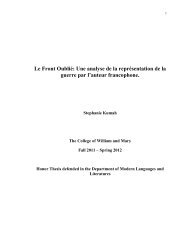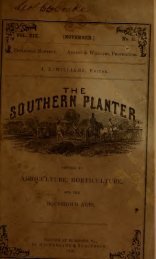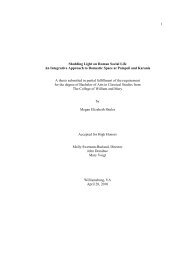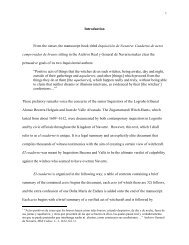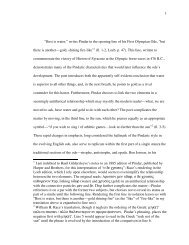Southern planter : devoted to agriculture, horticulture, and the ...
Southern planter : devoted to agriculture, horticulture, and the ...
Southern planter : devoted to agriculture, horticulture, and the ...
You also want an ePaper? Increase the reach of your titles
YUMPU automatically turns print PDFs into web optimized ePapers that Google loves.
done a day's work, <strong>and</strong> until Ihe dew goes<br />
off next morning. If a high temperature,<br />
your hay will <strong>the</strong>n be so dry that it will<br />
take no sweat; hence no flavour, <strong>and</strong><br />
much less nutriment. The trouble with<br />
those men who make a trial of cutting<br />
green, is that <strong>the</strong>y dry it so much in <strong>the</strong><br />
hot sun that it cannot sweat in ei<strong>the</strong>r cock<br />
or mow. I have seen stacks of hay in<br />
many places, <strong>the</strong> hay having been put up so<br />
dry, that if my arm had been long enough<br />
I could have put my h<strong>and</strong> through <strong>the</strong>m,<br />
<strong>and</strong> that after <strong>the</strong>y had s<strong>to</strong>od for months,<br />
<strong>and</strong> <strong>the</strong> hay had no inore flavour, (except<br />
<strong>the</strong> little ripe seed left on,) than brush<br />
from a dead tree. I want <strong>to</strong> see no stacks<br />
or hay mows put up for me but will in a<br />
week or ten days become so solid that it<br />
is with difficulty you can push your h<strong>and</strong><br />
in<strong>to</strong> <strong>the</strong>m one foot.<br />
Now, Messrs. Edi<strong>to</strong>rs, I have given you<br />
as lucidly as I can my views <strong>and</strong> reasons<br />
for deviating from <strong>the</strong> rules laid down by<br />
far more learned men, as <strong>to</strong> <strong>the</strong> time for<br />
cutting <strong>and</strong> manner of curing timothy hay,<br />
<strong>and</strong> indeed all o<strong>the</strong>r kinds of hay I have<br />
had any experience with in this hot climate.<br />
Yet I have no doubt but some of<br />
those men, possessed of good talents, will<br />
criticise my mode not a little, but all I ask<br />
is, that my bro<strong>the</strong>r workmg farmers will<br />
prove me <strong>and</strong> try me, <strong>and</strong> see whe<strong>the</strong>r I<br />
know anything of <strong>the</strong> true principles of<br />
making <strong>and</strong> time of cutting hay. Let<br />
<strong>the</strong>m follow my plan strictly, <strong>and</strong> <strong>the</strong>n<br />
ei<strong>the</strong>r approve or condemn it, according<br />
as <strong>the</strong>y find it. As haying will be in less<br />
than two months, I should be pleased if<br />
five hundred farmers in <strong>the</strong> State of<br />
New York would give my plan a trial <strong>and</strong><br />
report.<br />
It is high time, in this age of enterprise<br />
in <strong>the</strong> world, that <strong>the</strong> true time <strong>and</strong><br />
method of catting <strong>and</strong> curing hay was<br />
known, so as <strong>to</strong> make it most pleasant <strong>to</strong><br />
<strong>the</strong> taste of <strong>the</strong> dumb brutes, <strong>and</strong> most<br />
profitable <strong>to</strong> <strong>the</strong> owner.<br />
Mear Geneva.<br />
THE SOUTHERN PLANTER. 415<br />
John Johns<strong>to</strong>n.<br />
Few things tend more <strong>to</strong> alienate friendship<br />
than a want of punctuality in our engagements.<br />
I have known <strong>the</strong> breach of<br />
a promise <strong>to</strong> dine or sup, break up more<br />
than one intimacy.<br />
Functions of <strong>the</strong> Eoots <strong>and</strong> Leaves of<br />
Plants.<br />
A growing plant gains a new mouth <strong>and</strong><br />
s<strong>to</strong>mach with every additional root <strong>and</strong><br />
new leaf. The moisture of <strong>the</strong> soil which<br />
forms <strong>the</strong> sap of <strong>the</strong> plant, is taken in<strong>to</strong> it<br />
by <strong>the</strong> extremity of <strong>the</strong> roots, or ra<strong>the</strong>r<br />
by <strong>the</strong> spon^ioles which terminates <strong>the</strong><br />
ends of <strong>the</strong> fibrous roots. These possess <strong>the</strong><br />
power of absorbing <strong>and</strong> selecting <strong>the</strong> appropriate<br />
food required for each variety of<br />
plants. At least, we cannot on any o<strong>the</strong>r<br />
principle, so well assign a plausible reason<br />
for <strong>the</strong> many <strong>and</strong> varied phenomena in<br />
vegetable life with which we are so fa-<br />
miliar. As a simple illustration of this,<br />
we will refer <strong>to</strong> chemical analysis.<br />
The straw of wheat requires much silica<br />
in its composition, amounting in <strong>the</strong> ash of<br />
good wheat straw <strong>to</strong> over 28 per cent.,<br />
while in <strong>the</strong> straw of haulm of <strong>the</strong> field<br />
bean <strong>the</strong>re is less than 2^ per cent, of<br />
silica. In <strong>the</strong> ash of <strong>the</strong> stems <strong>and</strong> leaves<br />
of beans <strong>the</strong>re is 16| per cent, of potash,<br />
in <strong>the</strong> ash of wheat straw is less than one<br />
per cent. Why this difference of mine-<br />
ral matter in <strong>the</strong> two plants ? We all<br />
know <strong>the</strong>y can be successfully grown side<br />
by side in <strong>the</strong> same field. Each different<br />
plant selecting from <strong>the</strong> soil just so much<br />
<strong>and</strong> no more, of <strong>the</strong> several soluble inorganic<br />
substances as are required for <strong>the</strong><br />
perfection <strong>and</strong> maturity of each particular<br />
variety or species of plant. All <strong>the</strong> various<br />
phenomena of nature are <strong>the</strong> results<br />
of fixed laws, <strong>and</strong> no o<strong>the</strong>r reason can be<br />
assigned for <strong>the</strong>ir existence, than <strong>the</strong> will<br />
of <strong>the</strong> Crea<strong>to</strong>r—He hath so ordained it.<br />
The fluid taken from <strong>the</strong> soil by <strong>the</strong><br />
roots of a plant, consists chiefly in water,<br />
holding in solution some of <strong>the</strong> gases <strong>and</strong><br />
minute portions of saline <strong>and</strong> earthly ingredients,<br />
such as potash, soda, lime, silica,<br />
&.C. The soluble substances in water or<br />
sap, as it rises in<strong>to</strong> <strong>the</strong> stem <strong>and</strong> branches<br />
of <strong>the</strong> plant, for aught we know, may be<br />
gradually undergoing a series of changes<br />
from <strong>the</strong> time it enters <strong>the</strong> roots till it passes<br />
in<strong>to</strong> <strong>the</strong> leaf. In <strong>the</strong> leaf we know it is<br />
<strong>to</strong> experience various important changes or<br />
modifications.<br />
The nearly crude sap in <strong>the</strong> leaf is subjected<br />
<strong>to</strong> <strong>the</strong> process of exhalation. By<br />
carefully conducted experiments, it lias<br />
been pietty clearly ascertained, that of<br />
<strong>the</strong> whole amount of <strong>the</strong> water taken up<br />
by <strong>the</strong> roots of plants, about two-thirds of






